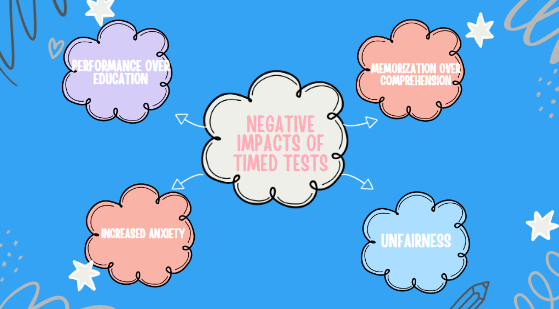
Timed tests have been a way of measuring students’ performance for centuries, aiming to gauge students’ ability to execute under pressure. However, this practice reveals a huge downside, as it may disable an understanding of a student’s true capabilities and create an environment that prioritizes speed over comprehension.
Over the years, timed tests have become a part of the evaluation process, yet the repercussions on student learning and well-being are increasingly raising concerns to students and peers.
Timed tests often encourage surface learning, where students prioritize memorization for short-term recall rather than an understanding of the material for later on. A study from the National Library of Medicine suggests that a student’s pace on a test does not reflect their intelligence or academic performance. It is shown that some students work quickly but perform poorly while other students work slowly but perform well, and all variations exist in between.
The timed pressure associated with exams can also contribute to heightened stress and anxiety levels among students. An article by Psychology Today found a direct link between test anxiety and performance in timed assessments, suggesting that the stress induced by time constraints directly affects outcomes. Many students have paired their stress with the classes that implement timed tests, creating an environment that students don’t feel comfortable learning in every day.
Timed tests may also disadvantage students with diverse learning styles, like individuals that process information at different rates. In many instances, students reported to have felt that school has become mainly focussed on performance levels rather than a space for education and learning. According to research published by Medium, speed-accuracy trade-off can be particularly challenging for students who need more time for thoughtful consideration and processing.
The continuous exposure to timed assessments may also eventually lead to a decline in motivation. The Self-Determination Theory, emphasizes the importance of autonomy and competence needed for self motivation. Timed tests, by their nature, might undermine and not account for these critical psychological needs and set students up for failure and continued stress in their lives.
While timed tests aim to assess academic success, their negative effects on learning, mental well-being, and inclusivity cannot be ignored. As education evolves, it is important to reconsider the role of timed assessments and try alternative methods that prioritize a deep understanding of subjects and a positive and motivating learning environment.







